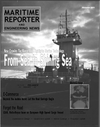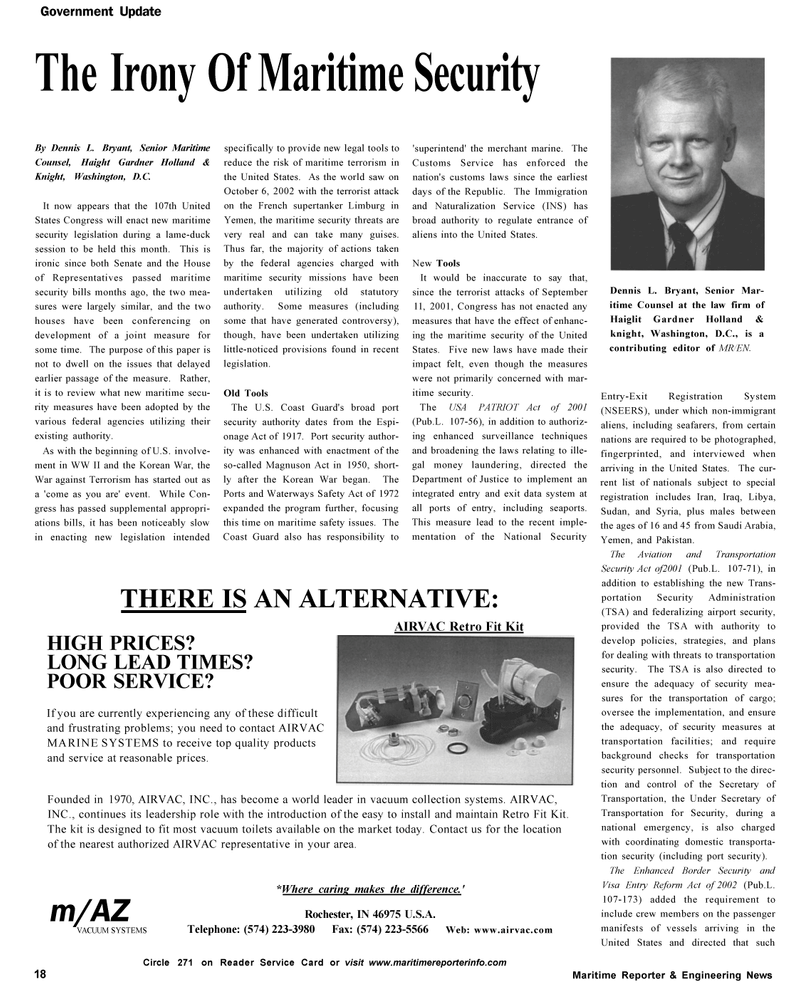
Page 18: of Maritime Reporter Magazine (November 2002)
Read this page in Pdf, Flash or Html5 edition of November 2002 Maritime Reporter Magazine
Government Update
The Irony Of Maritime Security
Dennis L. Bryant, Senior Mar- itime Counsel at the law firm of
Haiglit Gardner Holland & knight, Washington, D.C., is a contributing editor of MR/EN.
By Dennis L. Bryant, Senior Maritime
Counsel, Haight Gardner Holland &
Knight, Washington, D.C.
It now appears that the 107th United
States Congress will enact new maritime security legislation during a lame-duck session to be held this month. This is ironic since both Senate and the House of Representatives passed maritime security bills months ago, the two mea- sures were largely similar, and the two houses have been conferencing on development of a joint measure for some time. The purpose of this paper is not to dwell on the issues that delayed earlier passage of the measure. Rather, it is to review what new maritime secu- rity measures have been adopted by the various federal agencies utilizing their existing authority.
As with the beginning of U.S. involve- ment in WW II and the Korean War, the
War against Terrorism has started out as a 'come as you are' event. While Con- gress has passed supplemental appropri- ations bills, it has been noticeably slow in enacting new legislation intended specifically to provide new legal tools to reduce the risk of maritime terrorism in the United States. As the world saw on
October 6, 2002 with the terrorist attack on the French supertanker Limburg in
Yemen, the maritime security threats are very real and can take many guises.
Thus far, the majority of actions taken by the federal agencies charged with maritime security missions have been undertaken utilizing old statutory authority. Some measures (including some that have generated controversy), though, have been undertaken utilizing little-noticed provisions found in recent legislation.
Old Tools
The U.S. Coast Guard's broad port security authority dates from the Espi- onage Act of 1917. Port security author- ity was enhanced with enactment of the so-called Magnuson Act in 1950, short- ly after the Korean War began. The
Ports and Waterways Safety Act of 1972 expanded the program further, focusing this time on maritime safety issues. The
Coast Guard also has responsibility to 'superintend' the merchant marine. The
Customs Service has enforced the nation's customs laws since the earliest days of the Republic. The Immigration and Naturalization Service (INS) has broad authority to regulate entrance of aliens into the United States.
New Tools
It would be inaccurate to say that, since the terrorist attacks of September 11, 2001, Congress has not enacted any measures that have the effect of enhanc- ing the maritime security of the United
States. Five new laws have made their impact felt, even though the measures were not primarily concerned with mar- itime security.
The USA PATRIOT Act of 2001 (Pub.L. 107-56), in addition to authoriz- ing enhanced surveillance techniques and broadening the laws relating to ille- gal money laundering, directed the
Department of Justice to implement an integrated entry and exit data system at all ports of entry, including seaports.
This measure lead to the recent imple- mentation of the National Security
Entry-Exit Registration System (NSEERS), under which non-immigrant aliens, including seafarers, from certain nations are required to be photographed, fingerprinted, and interviewed when arriving in the United States. The cur- rent list of nationals subject to special registration includes Iran, Iraq, Libya,
Sudan, and Syria, plus males between the ages of 16 and 45 from Saudi Arabia,
Yemen, and Pakistan.
The Aviation and Transportation
Security Act of2001 (Pub.L. 107-71), in addition to establishing the new Trans- portation Security Administration (TSA) and federalizing airport security, provided the TSA with authority to develop policies, strategies, and plans for dealing with threats to transportation security. The TSA is also directed to ensure the adequacy of security mea- sures for the transportation of cargo; oversee the implementation, and ensure the adequacy, of security measures at transportation facilities; and require background checks for transportation security personnel. Subject to the direc- tion and control of the Secretary of
Transportation, the Under Secretary of
Transportation for Security, during a national emergency, is also charged with coordinating domestic transporta- tion security (including port security).
The Enhanced Border Security and
Visa Entry Reform Act of 2002 (Pub.L. 107-173) added the requirement to include crew members on the passenger manifests of vessels arriving in the
United States and directed that such
THERE IS AN ALTERNATIVE:
AIRVAC Retro Fit Kit
HIGH PRICES? LONG LEAD TIMES?
POOR SERVICE?
If you are currently experiencing any of these difficult and frustrating problems; you need to contact AIRVAC
MARINE SYSTEMS to receive top quality products and service at reasonable prices.
Founded in 1970, AIRVAC, INC., has become a world leader in vacuum collection systems. AIRVAC,
INC., continues its leadership role with the introduction of the easy to install and maintain Retro Fit Kit.
The kit is designed to fit most vacuum toilets available on the market today. Contact us for the location of the nearest authorized AIRVAC representative in your area. m/AZ
VACUUM SYSTEMS *Where caring makes the difference.'
Rochester, IN 46975 U.S.A.
Telephone: (574) 223-3980 Fax: (574) 223-5566 Web: www.airvac.com 18
Circle 271 on Reader Service Card or visit www.maritimereporterinfo.com
Maritime Reporter & Engineering News

 17
17

 19
19
